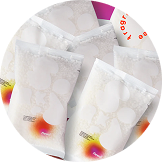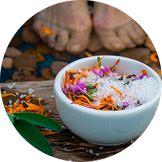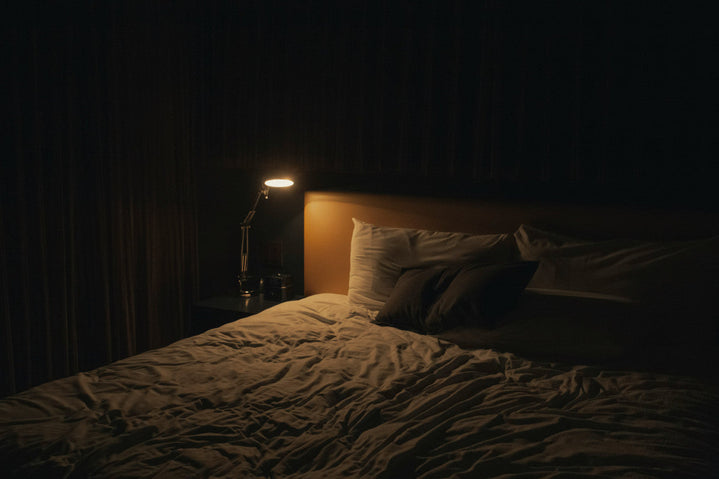You already know how disruptive sleep apnea can be if you’ve ever woken up gasping for air, struggled through the day with brain fog, or felt like no amount of sleep leaves you rested. Add stress to the mix and it’s no wonder your nights feel harder and your mornings heavier.
That raises a big question: can stress cause sleep apnea? Short answer: usually not. However, stress can certainly worsen sleep apnea if you’re already struggling with it. Those who have sleep apnea notice extra-tight muscles, more disruptions to sleep cycles, and a harder time breathing at night.
The good news, though, is you don’t just have to put up with stress-induced sleep apnea. This sleep apnea stress guide will walk you through some practical lifestyle changes, relaxation techniques, and sleep hygiene habits.
The best way to deal with sleep apnea caused by stress, though, is to stop stress at the source. That’s where our epsom salt substitute comes into play. Flewd Stresscare’s stress relief bath soak brings together the most bioavailable magnesium chloride with other proven ingredients to help calm your system and support restorative rest.
Get back to sleeping soundly through the night without the rude awakenings. Shop today!
“My rest and sleep has been horrific. Tonight I tried the insomnia pack and was asleep in less than an hour after and it took some serious alarms on my phone to wake me up. Thank you Flewd!” - Megan
“I was happily surprised with how much tension was allevaited with these bath soaks. I bought the whole mood bundle and now enjoy them a few nights a week. I sleep better, have less tension in my body and feel overall more relaxed.” - Mindy
“I was skeptical at first; but they do help me relax & sleep better. They also smell amazing. I've shared with friends & will be ordering more. Thanks Flewd.” - Nancy
What is Sleep Apnea?
This is a frustrating disorder where breathing repeatedly stops and starts during sleep. These pauses last a few seconds to a minute and can happen dozens of times an hour. So your body and mind never really get the deep, restorative rest they need.
This constant disruption sucks - not just in the moment, but when the consequences build up over time. Consistently poor sleep bleeds into every aspect of your life, from energy and focus to mood, recovery, and immunity.
Common Types of Sleep Apnea
There are actually a few different types of sleep apnea, each with its own specific set of causes and symptoms:
- Obstructive sleep apnea (OSA): The most common form, caused when throat muscles relax and block the airway.
- Central sleep apnea (CSA): Less common, this occurs when the brain fails to send proper signals to the breathing muscles.
There is also complex/mixed apnea - a combination of both OSA and CSA. Understanding which you’re suffering from is the first step towards managing the condition.
Key Symptoms of Sleep Apnea You Shouldn’t Ignore
- Loud, chronic snoring or gasping for air during sleep
- Morning headaches or dry mouth
- Daytime fatigue, irritability, or trouble concentrating
- Partners noticing you stop breathing at night
Sometimes these symptoms go overlooked or mistaken for just “bad sleep.” However, they always point to something more serious. Sleep apnea should not be ignored. It won’t just get better on its own.
Causes and Risk Factors of Sleep Apnea
While anyone can develop sleep apnea, these factors raise the likelihood of dealing with it at some point in your life:
- Excess weight or a thicker neck circumference
- Alcohol, sedatives, or smoking
- Family history or structural issues like a narrow airway
- Hormonal changes or neurological conditions
This begs the question, can stress cause sleep apnea as well?
Can Stress Cause Sleep Apnea?
Stress and sleep problems are a two-way street. Stress keeps your body in a state of “high alert,” while sleep apnea repeatedly wakes you throughout the night. Put them together and you’ve got a cycle that leaves you exhausted, foggy, and irritable the next day.
But can stress cause sleep apnea, or just make it worse? Let’s get to the bottom of it below.
How Stress and Sleep Are Interconnected
It’s no secret that stress and sleep are intertwined. Your body pumps out hormones like cortisol and adrenaline when it’s stressed. Both of these increase heart rate, tighten muscles, and disrupt your natural sleep cycles.
So instead of drifting off into a deep, restorative sleep, your body stays restless - even if you technically fall asleep. You may never reach REM sleep, which is where recovery actually occurs.
Chronic stress can also raise blood pressure and lead to an overactive inflammatory response, two things already linked to sleep apnea. So, does stress cause sleep apnea directly?
Does Stress Cause Sleep Apnea On Its Own?
The short answer is no - stress alone isn’t considered a root cause of sleep apnea.
Obstructive sleep apnea, the most common type, usually develops from physical factors like excess weight, enlarged tonsils, or airway structure. Central sleep apnea happens when the brain doesn’t send the right signals to breathing muscles.
In other words, stress doesn’t directly create these problems. What it can do, though, is act as a trigger. For example, stress-related behaviors like teeth grinding, jaw clenching, or staying up late with poor sleep hygiene can mimic or worsen apnea symptoms.
So let’s ask a different question: can stress make sleep apnea worse?
Can Stress Make Sleep Apnea Worse?
Definitely. Stress and sleep apnea feed into each other in a vicious cycle. Here’s how:
- More nighttime arousals: Stress keeps your nervous system in “fight-or-flight” mode, so your body is more likely to jolt awake from sleep apnea.
- Higher inflammation: Chronic stress worsens airway inflammation, in turn tightening passages and increasing obstruction.
- Poor recovery: Stress interrupts the deeper stages of sleep where your body can repair from apnea-related oxygen dips.
- Daytime exhaustion: Poor sleep raises stress hormones even further, locking you into a loop of stress, sleep apnea, and then even more stress.
So while stress might not cause sleep apnea directly, it can absolutely magnify its impact and make symptoms harder to manage. Don’t worry - we’ve got tips on managing stress-induced sleep apnea in just a few moments.
How Stress-Induced Sleep Apnea Affects Quality of Life
Discovering you’re dealing with stress-induced sleep apnea calls for immediate attention. The longer you let this issue fester, the worse it will get - and it can have harmful effects on other areas of your life.
The Vicious Cycle: Stress → Apnea → More Stress
We touched on this already, but stress makes it harder for you to reach deep sleep. Meanwhile, sleep apnea interrupts breathing, forcing frequent micro-awakenings.
The result is a loop where stress worsens sleep apnea, which in turn worsens your quality (and quantity) of sleep, and poor sleep ramps up your stress hormones the following day. This alone is reason to come up with a plan to get back on track - but that’s not to mention the physical and mental tolls stress sleep apnea can take.
Physical Health Risks of Sleep Apnea Combined With Stress
Both stress and sleep apnea are linked to elevated blood pressure, heart disease, and impaired glucose regulation. It makes sense that together, these risks are amplified.
Oxygen dips from apnea stress the cardiovascular system, while cortisol from chronic stress compounds inflammation. This dangerous dynamic duo can increase your risk of hypertension, arrhythmias, and metabolic disorders over time.
Impact on Mental Health and Cognitive Function
Let’s be honest - most of us feel the effects of poor sleep mentally more than anything else. It leaves your brain less able to regulate mood, focus, and memory. Add stress, and the effects multiply.
That’s why people struggling with sleep apnea and stress say they suffer from brain fog, irritability, or difficulty staying on task. The overlap of stress and sleep apnea can increase your vulnerability to anxiety and depression in the long run.
So, it’s time to put stress on pause and get back to sleeping soundly once again.
Tips on Dealing With Sleep Apnea and Stress
Managing sleep apnea and stress at the same time isn’t easy, but the good news is that both can be improved with intentional changes to your routine. Lifestyle adjustments, stress relief strategies, and supportive therapies can help break the cycle.
Lifestyle Changes That Support Better Sleep and Lower Stress
First, let’s talk about what you can control right now. These are small steps that, together, create a foundation where both stress and sleep apnea are easier to manage:
- Prioritize a regular sleep schedule: Going to bed and waking up at consistent times helps regulate circadian rhythms, even if you use a CPAP or other therapy.
- Limit alcohol and sedatives before bed: Both relax airway muscles, making sleep apnea worse and increasing nighttime awakenings.
- Move daily, but avoid late-night intensity: Light to moderate exercise earlier in the day reduces stress and supports deeper sleep. It can also help prevent restless legs at night.
- Build a calming pre-bed routine: Swap scrolling for stretching, journaling, or reading in low light to ease into rest.
Speaking of bedtime rituals, the best way to manage stress-induced sleep apnea is just a few clicks away at Flewd Stresscare - with the best magnesium for stress!
Melt Stress and Insomnia Simultaneously With Flewd Stresscare
A lot of people find that the hardest part of stress-induced sleep apnea isn’t the apnea itself. It’s the racing mind and restless body that make it impossible to wind down in the first place. That’s where our Insomnia Ending soak comes in. Here’s what you get in every soak:
- Magnesium Chloride Hexahydrate (47% concentration): Supports muscle relaxation and helps regulate overactive stress responses. This is the most bioavailable form of magnesium.
- Vitamin A & Vitamin E: Work together to support circadian rhythm signaling and cellular repair during sleep.
- Plant-derived L-Carnitine: Promotes energy balance so your body knows when it’s time to rest.
- Essential oils (Calamus, Mandarin, Citral, Linalool, D-limonene): Deliver a bright, sparkling scent based on Yuzu, with uplifting yet calming notes of grapefruit and orange.
The result? A soak that kicks stay-awake vibes, reduces wandering thoughts, and promotes the calm your mind and body need to slip into sleep.
Now, how fast does magnesium work for sleep? A lot of our customers choose to take their magnesium bath soak just 30-45 minutes before they want to sleep. Just draw a warm bath, dump the entire packet in, and indulge in 15-20 minutes of unparalleled relaxation.
No need to rinse after unless you prefer. For best results, use up to three times a week as part of your nightly wind-down. Stress apnea and sleep don’t stand a chance!
Natural Therapies That Support Relaxation and Airway Health
There are quite a few natural therapies you can turn to for help managing stress-induced sleep apnea, too. Simple practices like pursed-lip or diaphragmatic breathing reduce stress and may strengthen airway control. Even just 5-10 minutes of meditation or mindfulness a day can lower cortisol, reducing nighttime awakenings.
It’s also worth investing in a humidifier for your bedroom, as the extra moisture can reduce throat irritation and nasal congestion that worsen apnea. If you’re just dealing with mild obstruction, nasal dilators or strips can help improve airflow and reduce snoring.
These aren’t replacements for medical treatment, but they can reduce the burden on your body and complement formal therapies. On the note of medical treatment…
When to Seek Medical Help
If stress management and lifestyle adjustments aren’t improving your symptoms, it’s time to involve a professional. Signs it’s worth getting evaluated include:
- Loud snoring paired with pauses in breathing at night
- Daytime sleepiness so strong it affects work or driving
- High blood pressure or cardiovascular issues that aren’t responding to treatment
A sleep study can confirm whether you have obstructive, central, or mixed apnea, and your provider may recommend CPAP, oral appliances, or other medical treatments.
Even still, managing stress alongside these interventions only improves outcomes. So, it’s worth learning how to increase stress tolerance. Read our guide to learn more!
Bringing Our Sleep Apnea Stress Guide to a Close
So, can stress cause sleep apnea? It’s not likely. Rather, stress worsens sleep apnea and makes it hard to get the deep, restorative rest you need. Stress and sleep apnea feed into each other, creating a cycle that leaves you drained, foggy, and struggling through the day.
The good news? You can break it. From lifestyle changes and natural therapies to magnesium-rich rituals like our Insomnia Ending Soak, there are proven ways to reclaim better sleep and calmer nights.
Our blog has more resources on topics like magnesium carbonate vs citrate for sleep, but our magnesium chloride bath soaks are by far the best addition to your bedtime routine.
Don’t let stress overstay its welcome. Give your body the tools to reset at Flewd Stresscare!
Frequently asked questions
Does stress lead to sleep apnea?
Stress doesn’t directly cause sleep apnea, but it can definitely make matters worse by tightening muscles, disrupting sleep cycles, and raising cortisol levels. Each of these things make breathing issues more likely at night.
Can sleep apnea be triggered by anxiety?
Anxiety, just like stress, can certainly intensify symptoms of sleep apnea - but again, it won’t cause it on its own. Racing thoughts and shallow breathing at night make airway obstructions and awakenings more frequent.
What is the cause of sleep apnea?
The most common cause is airway obstruction from relaxed throat muscles (obstructive sleep apnea). Other causes include brain signaling issues (central sleep apnea) or a mix of both. A sleep study can help you hone in on the problem.
Can my sleep apnea go away?
Mild cases may improve with weight loss, lifestyle changes, or reduced stress, but most people need ongoing treatment or management to keep symptoms under control.
























































